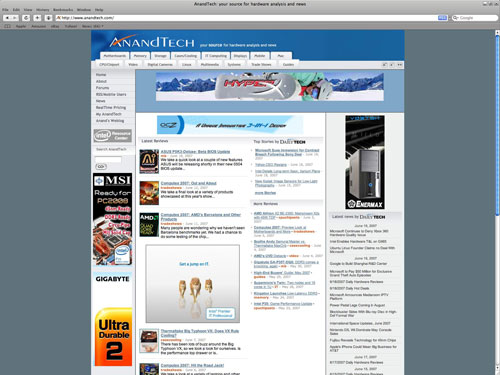"One more thing," the most anticipated words in a keynote speech given by Apple CEO Steve Jobs. The final major announcement of a Jobs keynote, one more thing is usually Apple's biggest and most secret product or project, previously having introduced items such as the MacBook Pro, various iPods, and AirPort 802.11 products. So whenever Jobs says those three words, the technology community tends to be all ears.
Not one to break tradition, at this year's Apple Worldwide Developer's Conference(WWDC), Jobs closed as always with one more thing, and as usual the audience got the unexpected. This year's conference and one more thing will likely be at the top of any top 10 lists for some time to come however, for the one more thing wasn't a new Apple product at all, it was Safari for Windows.
Safari, Apple's custom web browser for Mac OS X, has since its inception played a fairly minor role on the world wide web due to being limited to modern Macintosh computers, and hence a role and market share limited to the size of the Mac OS X install base. This has been scheduled to change for some time now as with the impending release of Apple's iPhone smartphone, Safari will be the shipping browser there too, with all indications of the iPhone quickly selling out. However nowhere in these public plans was a version of Safari for Windows, which may very quickly eclipse the market share effects of the aforementioned iPhone.
Given this unexpected release, it has taken very little time for Apple to drum up a lot of interest in Safari - having already passed 1 million downloads - nor has it taken long for a multitude of theories of sprout on and off of the WWDC show floor. It's not every day that someone releases a new web browser after all.
We have covered Safari in the past with our Mac OS X 10.4 review and A Month With A Mac series, with very little changing between Safari 2.0 and 3.0 other than Windows support. So rather than rehash those articles for anyone unfamiliar with Safari, we recommend reading those reviews first before continuing.
Since the release of Safari 2.0 when Apple managed to take care of many of the performance issues with Safari, Apple has been trying to build a reputation for Safari as a faster browser, something they have only been marginally successful at so far. Having finally corrected a number of their performance issues in Safari, this is the key point Apple is trying to push with Safari 3, and we're eager to put it to the test. However it takes more than speed to crack the browser market, including memory usage and a slew of generally subjective issues within a browser such as flow. Although Apple is neither a newcomer to the web browser market or the Windows market, both markets can be surprisingly fickle and treacherous at times.
Does Safari have what it takes to challenge the dynamic duo of Firefox and Internet Explorer on Windows, or does Apple need to go back to the drawing board? Let's find out.











28 Comments
View All Comments
sprockkets - Friday, July 6, 2007 - link
I think I'll stick with Konqueror on Linux, oh wait...Googer - Sunday, July 8, 2007 - link
Opera and Safari are the only two that get a passing grade with ACID 2.Konqueror cannot pass the ACID 2 browser test. And that's not the only one IE, Mozilla, and Konqueror cannot pass. There are others.
http://www.webstandards.org/">http://www.webstandards.org/
Googer - Sunday, July 8, 2007 - link
Also according to Extremetech, Safari had problems with Citibank.comhttp://www.extremetech.com/article2/0,1697,2152775...">http://www.extremetech.com/article2/0,1697,2152775...
Xenoterranos - Friday, July 6, 2007 - link
I use portable firefox everywhere, and could see the usefulness of having a portable safari on my flashdrive. Is there any chance this is portable, or could be easily be made such?John Haller, I'm looking at you.
SilthDraeth - Friday, July 6, 2007 - link
I know in Firefox you can typeabout:config
and then you can turn on pipelining etc, and it greatly speeds up rendering and loading of websites by enabling more simultaneous pipes.
Spoelie - Friday, July 6, 2007 - link
Just to confirm this, even tho ff supports pipelining it is indeed disabled by default. All the other browsers have it enabled as far as I know, which at least explains part of the loading issue.As to why it is disabled by default, the only reason I can remember were some dodgy webservers not supporting the feature properly.
Ryan Smith - Friday, July 6, 2007 - link
Yes, it was all done with default settings.crimson117 - Thursday, July 12, 2007 - link
I appreciate keeping things at default settings, but I'd be very interested to see Firefox's load times with the one simple pipeline tweak enabled.